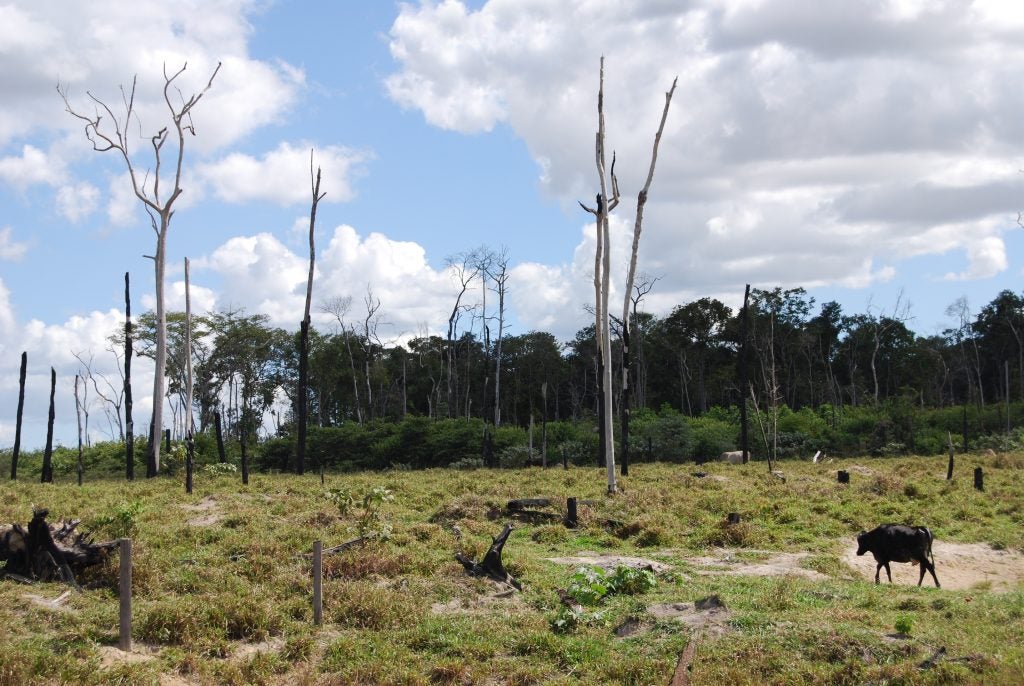
Cattle grazing at a ranch where burned trees and the edge of the rainforest are still visible in Brazil. Shutterstock.
Presidents Trump and Bolsonaro had a lot of common ground to share when they met in Washington last week – racism, misogyny, conspiracy theories, and contempt for science and journalism (the high quality type). They also converge on an early 1900’s view of development and environment as a zero-sum game. The more you have of one, the less there is of the other.
The economics don’t add up for either of them. Trump crows about “beautiful” coal, but the market says coal is a loser compared to renewables and cleaner fuels. Bolsonaro wants to get out of the Paris climate accord and roll back indigenous land rights in favor of agribusiness and mining. Meanwhile, the executive director of the powerful Brazilian Agribusiness Association says “Whoever wants to leave the Paris Agreement has never exported anything.”
Climate denial is central to Trump’s and Bolsonaro’s mindsets, and here the conspiracy theories really go to town. Trump thinks climate change is a Chinese conspiracy to strangle the US economy. Bolsonaro’s Foreign Minister thinks climate change is part of a “cultural Marxist” plot to keep down western democracies and build up Marxist China (he also thinks the “cultural Marxists” want to criminalize red meat and heterosexual sex). Interestingly, former President Dilma Rousseff’s first Minister of Science and Technology, former Communist Party of Brazil Congressman Aldo Rebelo, thought climate change was a capitalist conspiracy to crush Brazilian development. Why let political differences spoil a good conspiracy theory?
You can really only hold on to that early 20th century dichotomy if you ignore the costs of climate change – and the economic opportunities that arise from fixing the problem.
Case in point: continued deforestation in the Amazon is getting ever closer to a “tipping point,” at which much of the region would become savanna, with enormous consequences for the rains that agriculture in Brazil (and other places as far away as California) depends on – and for the numerous other environmental services that large continuous expanses of tropical forest provide.
There’s a better way forward. Presidents Bolsonaro, who says he admires the US, and Trump could both look to California as a great example of a state that is protecting the environment while growing its economy.
California approved emissions reductions policies in 2006, in spite of polluters’ dire warnings of economic ruin. Since then, the state has exceeded its emissions reductions targets, while growing from the eighth to fifth-largest economy in the world and creating jobs faster than the US. Because of the carbon constraints, renewable energy and green jobs are booming.
Countries from Mexico to China are partnering with California and looking at how they might link up with the state’s strong carbon market. The California Air Resources Board, an environmental agency that increasingly plays a global leadership role on climate, recently released a standard that would help California send a powerful signal of support for the people and nature most threatened by Bolsonaro.
The California Tropical Forest Standard lays out rigorous criteria for states and provinces that want access to carbon markets, like California’s, for jurisdiction-wide reductions in deforestation. These include transparent guarantees that indigenous peoples’ rights – including land rights and rights to free, prior and informed consent in development initiatives – are respected and that indigenous and traditional peoples benefit from deforestation reduction programs.
The most important thing California can do right now to support the indigenous peoples who are on the front line of defense against Bolsonaro’s war on the forest and forest peoples would be to endorse the Tropical Forest Standard. It would be a concrete demonstration that indigenous territories and their vast social and biodiversity are assets in the emerging 21st century low-carbon economy.
California’s leaders — unlike Trump and Bolsonaro – are addressing the realities of the 21st century and finding ways to make climate action the basis of sustainable growth. This is good news for the people of California and the global atmosphere. There’s probably not much hope for Trump. But California’s endorsement of the Tropical Forest Standard could get Bolsonaro’s team thinking about how to leave their time warp and join the 21st century.









